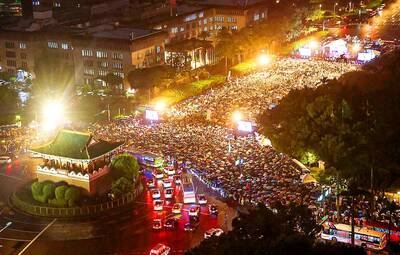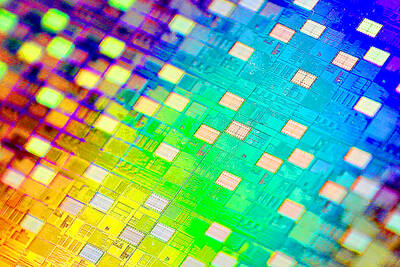Testing of 19 brands of brown sugar sold in farmers’ markets and supermarket chains across the nation found that they all contain the suspected carcinogen acrylamide, a report in a Chinese-language magazine said.
Common Health Magazine last week released the results of the tests, which found that of the 19 products scrutinized, brown sugar purchased at a farmers’ market contained the highest level of acrylamide at 2,740 micrograms (mcg) per kilogram.
Acrylamide levels in seven of the brands tested above 1,000mcg/kg, while the lowest one had 30mcg/kg.
The 30mcg/kg to 2,740mcg/kg range is higher than the 10mcg/kg to 1,448mcg/kg range suggested by local health authorities in 2003 for fried and baked foods.
The 19 packs of brown sugar tested were purchased from organic supermarket chains, hypermarkets, regular supermarket chains and farmers’ markets, according to a report on the study that is to be published in this month’s edition of the magazine.
Cheng Wei-chih (鄭維智), a section chief with the Food and Drug Administration’s Division of Food Safety, said neither the international community nor Taiwan has set a maximum permissible level for acrylamide.
However, the Ministry of Health and Welfare has conducted many discussions and studies on the chemical compound, and it published a reference manual in 2012 for the food industry that explained how to reduce acrylamide in food products, he said.
Magazine representatives said that the manual has never been properly disseminated and some food companies still do not know what acrylamide is, as they urged the government to take the issue seriously.
Acrylamide is a white odorless crystalline solid that is soluble in water, ethanol and chloroform. It is used in wastewater treatment, paper making, ore processing, oil recovery and the manufacture of permanent-press fabrics.
The substance is also found in fried foods or foods cooked at high temperatures, including potato chips, french fries, coffee and bread.
According to cancer.gov, acrylamide appears to form at temperatures above 120°C.
Brown sugar is vulnerable because of the way it is processed.
Chen Chun-chi (陳俊吉), an instructor in food production techniques at the School of Continuing Education of Chinese Culture University, said brown sugar is produced by repeatedly cooking and stirring sugarcane juice in a large wok.
He said that adding magnesium chloride to sugarcane juice before heating it, keeping the temperature from surpassing 120°C and pressing peeled sugarcane for juice are the best ways to reduce the formation of acrylamide when making brown sugar.
Though acrylamide has been found to pose a risk of several types of cancer in animals, the evidence from human studies remains incomplete, according to cancer.gov.
The US Environmental Protection Agency said it is likely to be carcinogenic to humans and in 2010 the European Chemicals Agency listed it as a substance of very high concern.
Wu Kuen-yu (吳焜裕), a professor of occupational medicine and industrial hygiene at National Taiwan University, said that the substance was clearly carcinogenic in animals and was found likely to cause genetic damage to the nervous system.
However, because it has still not been determined whether acrylamide causes cancer in humans, governments have been unable to set a safe intake level, Wu said.

The Central Weather Administration (CWA) today issued a "tsunami watch" alert after a magnitude 8.7 earthquake struck off the Kamchatka Peninsula in northeastern Russia earlier in the morning. The quake struck off the east coast of the Kamchatka Peninsula at 7:25am (Taiwan time) at a depth of about 19km, the CWA said, citing figures from the Pacific Tsunami Warning Center. The CWA's Seismological Center said preliminary assessments indicate that a tsunami could reach Taiwan's coastal areas by 1:18pm today. The CWA urged residents along the coast to stay alert and take necessary precautions as waves as high as 1m could hit the southeastern

FINAL COUNTDOWN: About 50,000 attended a pro-recall rally yesterday, while the KMT and the TPP plan to rally against the recall votes today Democracy activists, together with arts and education representatives, yesterday organized a motorcade, while thousands gathered on Ketagalan Boulevard in Taipei in the evening in support of tomorrow’s recall votes. Recall votes for 24 Chinese Nationalist Party (KMT) lawmakers and suspended Hsinchu City mayor Ann Kao (高虹安) are to be held tomorrow, while recall votes for seven other KMT lawmakers are scheduled for Aug. 23. The afternoon motorcade was led by the Spring Breeze Culture and Arts Foundation, the Tyzen Hsiao Foundation and the Friends of Lee Teng-hui Association, and was joined by delegates from the Taiwan Statebuilding Party and the Taiwan Solidarity

Instead of threatening tariffs on Taiwan-made chips, the US should try to reinforce cooperation with Taiwan on semiconductor development to take on challenges from the People’s Republic of China (PRC), a Taiwanese think tank said. The administration of US President Donald Trump has threatened to impose across-the-board import duties of 32 percent on Taiwan-made goods and levy a separate tariff on semiconductors, which Taiwan is hoping to avoid. The Research Institute for Democracy, Society, and Emerging Technology (DSET), a National Science and Technology Council think tank, said that US efforts should focus on containing China’s semiconductor rise rather than impairing Taiwan. “Without

The National Museum of Taiwan Literature is next month to hold an exhibition in Osaka, Japan, showcasing the rich and unique history of Taiwanese folklore and literature. The exhibition, which is to run from Aug. 10 to Aug. 20 at the city’s Central Public Hall, is part of the “We Taiwan” at Expo 2025 series, highlighting Taiwan’s cultural ties with the international community, National Museum of Taiwan Literature director Chen Ying-fang (陳瑩芳) said. Folklore and literature, among Taiwan’s richest cultural heritages, naturally deserve a central place in the global dialogue, Chen said. Taiwan’s folklore would be immediately apparent at the entrance of the